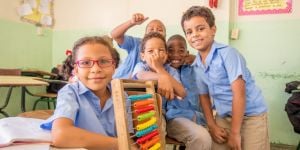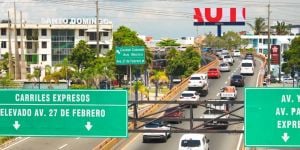COVID-19
Last activity 21 June 2022 by ducketts
7427 Views
3271 replies
Subscribe to the topic
Post new topic
WW returning doms are no doubt a problem but so are arrivals from Venezuela Columbia, Brazil and Argentina, the from Central america and the Caribbean too and maybe Poland and Ukraine with high numbers posted in April. From India there were 538 arrivals in April - Delta flyers?
I agree... my point was a normal visitor is quite isolated from the general public
I see your point.... yes


As expected, Santiago, La Altagracia, Espaillat and even La Vega, Duarte and Puerto Plata are seeing things go downhill rapidly with the more relaxed curfew. Only 40% of cases reported today are now in SD. A total of 33,500 under 20s infected out of 306,698 for those that say the young don't get and transmit.
From MOH this morning as reported just now in Diario Libre:
Authorities warn of increase in cases in children under 20 years of age
[link under review]
https://www.diariolibre.com/actualidad/salud/salud-publica-reporta-cinco-defunciones-por-covid-19-y-1129-nuevos-contagios-EO26825436
Increase in cases in those under 20 years of age
[i]The epidemiological bulletin issued this June 11 reports that 33,500 young people under 20 years of age who have been infected with the virus, so the authorities urge this group to comply with the measures of distancing, hand washing and mandatory use of masks.
In addition, they reiterate the call to young people to go to be vaccinated, because in recent weeks most of those killed by the virus are young people, who had not received the vaccine against COVID-19.[/i]
Seems there is a health risk of myocarditis in young men in mRNA vaccines for covid19.
Evidence grows stronger for Covid vaccine link to heart issue, CDC says
https://www.nbcnews.com/health/health-n … s-n1270339
Israel sees probable link between Pfizer vaccine and myocarditis cases
https://www.reuters.com/world/middle-ea … 021-06-01/
DR has just bought a whole load of Pfizer vaccine specifically for under 18s.
What next?
Hi to all.
Sure, no good news at all, BUT:
If you were the captain of a big ocean liner with - let's say - 10.000 people on board. Ship is taking water and threatens to sink.
You had short time to let construct a new tool to fix the leakage, but it was never tested or qualified before use. The risk could be, that the man who uses this tool will be hurt or die.
Which decision would be yours?
Up to now it is not possible to develop risk free drugs in a period of only one year.
All that can be done is to lower the damage for the mass of a population.
Not perfect at all, but do we have another chance?
Best
Tom
- Human beings only exist because of evolution.
- Evolution is driven by mutation and selection.
- Mutation is mainly driven by UV-light and natural radioactivity.
- The smaller the DNA of an organism, the higher it's mutation rate.
- Viruses are therefore predestined for rapid mutation.
And we all ourselfs pushed mutation by pollution of radioactivity and ozone-reducing (= UV-light increasing) substances since middle of last century.
That's it.
Easy.

The lack of genomic testing in DR and low testing levels generally leave the country blind to what is happening with the varianst and spread.
This is a good insight on variants today from BBC:
Covid: Is there a limit to how much worse variants can get?
https://www.bbc.com/news/health-57431420
What is causing the severe outbreak in Barahona where positivity was 75% yesterday and people are dying?
https://listindiario.com/la-republica/2021/06/12/674620/diputada-de-barahona-pide-a-abinader-intervenir-la-provincia-asegurando-que-aqui-eso-es-muerto-y-muerto-por-covid
On the positive side, 228k doses of Pfizer was received yesterday and vaccination of 12 to 18 year olds has strated today with this vaccine in SD and Santiago. also a further 1.5 million doses of Sinovac arrive next Wednesday and the application of first doses resumed today nationally.
Vaccination is the only way to a better place for DR and the progress remains good with nearly 2 million fully vaccinated now:
Plan Nacional de Vacunación
Acumulados al 11 de Junio de 2021
4,227,940
Primera dosis
1,945,871
Segunda dosis
6,173,811
Total dosis aplicadas
1,945,871
Población completamente vacunada
Agreed- Vaccinations are key
We cannot defeat this virus, but if addressed properly we can manage it.
Again , it seems the vaccinating is the road
This isn't getting any better as cases spread all around the country and even appearing in Samana now.

lennoxnev wrote:This isn't getting any better as cases spread all around the country and even appearing in Samana now.
Yep - as long as the virus is spreading in the capital and there is free travel around the country, we'll be getting exposed in Samana!
I have been happy to see the vaccine centers here in LT full of people. Fortunately, the main center now is open-air until you go in with the nurse for your jab because there is no room for social distancing!
The day we went for our second shot, at about 3:30, they had to close the gate because they only had enough shots for those already registered.
Slightly better indicators today in part suggesting there may be a trend to a gradual reduction of cases in greater Santo Domingo, but possibly at the expense elsewhere in the country - every province had more than one new case apart from Monsenor Noeul. All the seven provinces outside the tighter curfew are seeing higher positivities and cases though. We do need much more testing though, rather than rely on one days numbers.

Reduction in cases in greater Santo Domingo, but look more closely and the number of tests was much lower too and the day positivity was 25.5%. 

6pm to 5am every day in the 25 provinces and no change to the 7, and still the drink rule kept.
Government eases curfew on weekends in 25 provinces
https://listindiario.com/la-republica/2 … provincias
President Luis Abinader ordered that the curfew on weekends will begin at 6:00 in the afternoon for 24 provinces and the National District.
Decree 378-21 establishes that from this Wednesday the 16th to Wednesday the 23rd of June, both inclusive, the curfew will be every day, from 6:00 in the afternoon to 5:00 in the morning.
The measure includes a grace of free movement until 9:00 at night, with the sole purpose that people can go to their respective residences.
In addition to the National District, the provinces included in the presidential order are Azua, Bahoruco, Barahona, Dajabón, Elías Piña, El Seibo, Hato Mayor, Hermanas Mirabal, Independencia.
Also, La Romana, María Trinidad Sánchez, Monsignor Nouel, Monte Cristi, Monte Plata, Pedernales, Peravia, San Cristóbal, San José de Ocoa, San Juan, San Pedro de Macorís, Sánchez Ramírez, Santiago Rodríguez, Santo Domingo and Valverde.
Beverage restriction
The other measures provided in articles 7 to 20 of Decree 349-21, of May 30, 2021, are extended until Wednesday, June 23, 2021, inclusive, at which time the corresponding authorities will review such measures, as well as those provided in this decree.
In this sense, until that date the prohibition of consuming alcoholic beverages from 3:00 in the afternoon in public and private establishments for public use, as well as the sale of these products if it is for consumption in those places, is maintained.
On the other hand, alcoholic beverages can be sold until the normal curfew time, depending on the demarcation in question, as long as it is sold to take-out (take-out) or at home (delivery) in its original sealed container.
Time does not vary in 7 provinces
Meanwhile, the seven remaining provinces, that is, Duarte, Espaillat, La Altagracia, La Vega, Samaná, Santiago and Puerto Plata, the curfew schedule remains until Wednesday, June 23 of the current year as it was.
That is, Monday through Friday from 10:00 p.m. to 5:00 a.m. and on Saturdays and Sundays from 9:00 p.m. to 5:00 a.m.
It maintains the same grace of free movement until 12 midnight every day, with the sole purpose that people can go to their respective residences.
IDIOTS. Just proves they do not learn from repeated mistakes!!!!!!!!!!!
The weekend change to 6pm didn't surprise me - it is hard to police that and it does help commerce whilst the restriction on drinking in public remains. The latter being very effective at stopping many 'teteos'.
What is the surprise is that the longer curfew was not extended to some, if not all of the 7 provinces which are showing rapid increases in positivity and cases. But I guess it is economically driven.
If they continue to keep the longer hours and drinking restrictions for a few weeks more, we should see improvements as the vaccination effect starts to kick in too.
But allowing mobility in Santiago and nearby provinces and the resort provinces for longer hours may come back to bite them with a trend upwards there and downwards elsewhere.
Totally agree!
We've been at our apartment in Playa Bonita for the past week and a half - we were staying here while my son was visiting, and decided to stay until our next renter shows up! The two weekends have been packed - with tons of people from Santo Domingo here in large groups, partying at the pool or on their terraces. Last night, I was out walking the dog and saw a dozen people crawl out of a taxi! It was like a clown car - they just kept coming out, no one but the driver wearing a mask.


Those parties in Samana are now showing up in daily numbers(63 tests 24 positives).
Numbers up again. Arrests are still high and yes let's relax weekend curfew!!!
I'm wondering why if numbers are up throughout the country, the U.S. State Department has lowered it's travel advisory for Americans to visit the RD?
Vaccination progress has been excellent.
Among countries with >1mm population, DR is administering vaccinations at fastest rate in the world over the last 7 days (1,531 doses per 100,000 people).
~20% fully vaccinated and ~40% with one dose.
Things could improve faster than you'd expect if they can keep up the pace on vaccinations
It sure doesn't make sense for US travel advisory changes!
Vaccination going well but until those second dosis are in things need to stay strict
Allor925 wrote:I'm wondering why if numbers are up throughout the country, the U.S. State Department has lowered it's travel advisory for Americans to visit the RD?
DR has stated that it has a lower incidence of covid19 presence in the tourist zones and perhaps this is the reason for a reduced advisory level?
On a more serious note, the Delta variant (from India) is now circulating in the USA and Puerto Rico. It is hard to believe it is not here already with so many daily flights coming in.
But this government will not do anything more than it already is doing and they still rely on the vaccinations being the short term as well as longer term solution. They stated today that the vaccines provide protection against variants which is partly true in that the protection comes after full dosage and at reduced protection.
According to Our World in Data the vaccination rate has tailed off in the past several days, but this could be due to second doses being applied and with the arrival of a further 1.5 m shots today and 200k on Friday there will be plenty to go around and this should pick up again.
Second shots were being applied in my village today and there were long queues.
I've not seen any data about Sinovac and this variant that is so dangerous. Anyone seen anything?
We are only going to get good real world information on the effectiveness of vaccines from countries doing lots of genomic testing such as the UK and USA where Delta is now spreading fast. Sinovac is not in use in these countries but in India they have a deactivated locally made vaccine Covaxin which is showing positive results against the Delta variant which might be a indicator to the effectiveness of the other deactivated virus vaccines. https://theprint.in/health/covaxin-effe … ys/674694/ Covishield is another vaccine in use in India and is an AZ licensed vaccine in use in DR incidentally.
This is a good article just now from National Geographic which indicates how this variant will fare against Pfizer and AZ vaccines.
The Delta variant is serious. Here’s why it's on the rise.
https://www.nationalgeographic.com/scie … n-the-rise
With vaccination rates slowing in the United States, and other countries struggling to secure vaccines, public health experts have growing concerns that the so-called Delta coronavirus variant, first identified in India in March, could trigger dramatic rises in cases and deaths in the U.S. and the world.
The Delta variant already accounts for 18 percent of cases in Colorado, Montana, North Dakota, South Dakota, Utah, and Wyoming, and about six percent of cases nationwide. It has already spread to more than 70 countries and is now the most dominant variant in India, the United Kingdom, and Singapore. Last week, Delta caused more than 90 percent of the new COVID-19 cases in the U.K., leading to a 65 percent bump in new infections since May 1. On Monday, to curb Delta’s spread, the U.K. government decided to postpone “freedom day,” which would mark the end of public health restrictions.
The Delta variant is 60 percent more transmissible than the Alpha variant—first identified in the U.K.—which in turn was about 50 percent more transmissible than the ancestral Wuhan strain. “It’s a super spreader variant, that is worrisome,” says Eric Topol, founder and director of the Scripps Research Translational Institute. It has features that enable escape from the immune system and is perhaps more evasive than the Beta variant (B.1.351) first identified in South Africa, which was the worst until now, says Topol. “Plus, it has the highest transmissibility of anything we've seen so far. It's a very bad combination.”
Dismayed by the trajectory of Delta in the U.K., Anthony Fauci, head of the National Institute of Allergy and Infectious Diseases, warned President Joe Biden last week, “we cannot let that happen in the United States.”
The President echoed those sentiments, tweeting “Folks, the Delta variant—a highly infectious COVID-19 strain—is spreading rapidly among young people between 12 and 20 years old in the U.K. If you’re young and haven’t gotten your shot yet, it really is time.” A complete dose of a COVID-19 vaccine is still effective at preventing serious COVID-19 stemming from Delta infection.
Why is the Delta variant so scary?
Freely circulating viruses, especially coronaviruses and influenza viruses, which encode their genetic instructions using the molecule RNA, mutate frequently and randomly due to copying errors introduced as they replicate in their human host cells. Some mutations enable the virus to evade antibodies; some enhance its ability to infect a cell; others go unnoticed since they yield no benefits or can even weaken it.
The key to Delta’s success is the collection of mutations the variant has accumulated in the spike protein, which covers SARS-CoV-2 and gives the virus its signature crown-like appearance. These mutations have changed the spike, and, as a result, some of the existing antibodies may not bind as tightly or as often, explains Markus Hoffmann, an infectious disease biologist at the Leibniz Institute for Primate Research in Germany. Hoffman and others have shown that Delta and its closely related Kappa variant evade antibodies that were generated through previous infection and vaccination. Some synthetically produced antibody therapies, like Bamlanivimab, were unable to neutralize the Delta variant; but others such as Etesivimab, Casirivimab, and Imdevimab were still effective.
The Delta variant has mutations on the spike protein that alter how it interacts with the ACE2 receptor protein, which is found on the surface of lung and other human cells and is the portal to invade the cell. The mutation at location 452 of the spike protein, which is also present in some of the California variants, appears to make the virus more transmissible and helps it spread through the population, explains Mehul Suthar, an immunologist at the Emory Vaccine Center.
If a mutation gives a virus a fitness or reproductive advantage, that mutation tends to evolve independently around the world. Delta, its closely related variants, and the highly contagious Alpha variant all carry a mutation at position 681 of the spike protein, which is thought to be an evolutionary game changer that also makes it easier for SARS-CoV-2 to invade the host cell and spread. This mutation is fast becoming common in COVID-19 viruses around the globe.
In addition to these mutations a recent study, not peer reviewed, shows a variation at position 478 on Delta’s spike that enables the virus to escape from weak neutralizing antibodies. This mutation has also become increasingly common in SARS-CoV-2 variants in the U.S., Mexico, and Europe since early 2021.
“When you have all of these mutations, then you start seeing a difference in infectivity (of the virus),” says Ravindra Gupta, a professor of clinical microbiology at the University of Cambridge, who has shown in an unpublished study how these variants can have a greater potential to cause disease.
Vaccines less effective against this super spreader
The data from India and the U.K. show that Delta has emerged as the dominant variant in those countries within four to six weeks. That indicates Delta is more transmissible and infectious than the previous variants. There is emerging evidence that it can also cause more severe disease. For example, in Scotland it caused about twice as many hospitalizations than the Alpha variant, which already caused more severe illness than the original SARS-CoV-2.
“This combination of high transmissibility, high severity, and escape from vaccines makes Delta a very, very dangerous variant,” says Deepti Gurdasani, a clinical epidemiologist at Queen Mary University of London. Once Delta enters a country, it is going to spread rapidly. “It's going to be quite hard to contain, and very likely will become the dominant variant in a matter of weeks. It could change the trajectory of the global pandemic.”
While vaccines are still effective against severe disease and hospitalization caused by the Alpha and Beta variants, they offer less protection against Delta. People who were vaccinated with one or two doses of the Pfizer vaccine produced lower levels of antibodies capable of neutralizing the Delta variant compared with the levels generated against Alpha and Beta. In the U.K., 31 percent of all confirmed Delta variant patients who needed emergency care had received at least one vaccine dose.
Similarly, a study under review revealed that after both doses, the Pfizer vaccine showed 88 percent effectiveness against symptomatic disease caused by the Delta variant compared to 93 percent against the Alpha variant. Two doses of AstraZeneca vaccine were 66 percent effective against Alpha but only 60 percent against Delta. But with just single dose of either of the two vaccines, the vaccine effectiveness was only 51 percent against the Alpha variant compared to 33 percent against Delta. This effectiveness falls below the 50 percent efficacy threshold the FDA had set for designing safe COVID-19 vaccines; in which a vaccine should prevent at least half of the vaccinated people from getting COVID-19 symptoms.
In other studies still awaiting peer review, researchers report that Delta was responsible for most breakthrough infections—which occur after full vaccination—in India leading to a cluster of such cases among fully vaccinated healthcare workers.
There are many vaccine candidates being rolled out around the world and since there are no agreed international efficacy standards, each vaccine might offer a varying degree of protection against new variants. “We need more information about the performance of some of the more widely available vaccines in other parts of the world,” says physician and virologist Benjamin Pinsky of Stanford University School of Medicine. “I think folks need to make sure they get vaccinated. And until they are fully vaccinated, continuing with public health intervention is very important,” he says.
A vaccine alone only slows down the progression of a contagious disease by increasing the herd immunity. Until that point, preventive measures such as social distancing and masking are proven strategies for curbing the spread of the virus.
With just 44 percent of the U.S. population fully vaccinated, the majority of people are still vulnerable. Relaxing public health restrictions and declaring victory prematurely could provide an opportunity for the Delta variant to surge–particularly in the fall.
A study, not yet published, suggests the possibility of seasonal variations in COVID-19 incidence based on analyses from a full year of the pandemic in Europe and Israel. While the virus’s seasonal trends may not be clear yet, says Topol, we do know that when people spend more time indoors with poor ventilation and low humidity the virus spreads more rapidly.
What is happening in the U.K. could occur in many places worldwide. “We should keep social distancing after vaccination, because there will always be possibilities of breakthrough infection because vaccines can still be imperfect against emerging variants,” says Kei Sato, a virologist at the University of Tokyo, Japan, who has been studying the effect of mutations on the transmission of Delta and other emerging variants.
“The more variants like this spread, especially in unvaccinated individuals, the more these viruses mutate and eventually pick up mutations that allow for more efficient antibody escape. This could, in theory, make the current vaccines even less effective against these variants.” Suthar cautions.
If we don’t take Delta seriously, “there will be a further wave in the U.S. We can already see the fall in cases has plateaued,” cautions Gupta. Topol agrees that if we ignore this variant “we’ll have a significant rise in cases in vulnerable areas, more hospitalization, and the pandemic here will last longer.”
My friend was looking for a first shot today.....
Only 2nds being given in the Cabrera area it seems
Come back in 2 weeks
Just looking at the numbers, there are 2.1m second doses to give, so the 1.5m that arrived this afternoon may be largely needed for that. And they will keep some for the planned mass vaccinations this weekend just announced for south and east.
So perhaps the two weeks represents when they expect the next major Sinovac shipment.
Your friend might fare better going to one of the Pfizer shot centres in SD or Santiago now that we know 200k will arrive each week.
It will be great if they get 4m fully vaccinated this month.
Going in wrong direction it seems.
Today in SD 1st shots being given at Agora Mall and many other locations.
RD is still waiting for COVID sample results to determine if there are new variants
https://listindiario.com/la-republica/2 … -variantes
Dominican health authorities continue to await the results of 120 new sequenced COVID-19 samples, which were sent to laboratories in Brazil and the United States at the beginning of the month to determine the presence of new variants of the virus in the country.
This was reported by the head of the National Epidemiology Directorate, Ronald Skewes, who also stated that they usually obtain the results up to four weeks later, after sending the samples.
“We still do not have results, we have not received the results yet. Usually they take between three to four weeks, but (the waiting time) depends a lot on the demand of the laboratories, ”Skewes explained to LISTÍN DIARIO last Saturday.
For this reason, the national director of Epidemiology urged the population to be patient during the waiting period.
The samples to be analyzed, collected in various provinces of the country, were sent last Thursday, June 3, and at that time Skewes affirmed that 24 variants were already circulating in the Dominican Republic, according to the latest studies.
This is a nonsense.
We will wait 4 weeks to find out if variants are circulating at a time we have open borders with limited testing on arrival and Delta is spreading in the USA (and many other coutries too), and is expected to be the domininant variant there in the same sort of period.
And as daily bulletin evidence, the virus is spreading just as much if not more than before the tougher curfew was introduced with restricted alcohol sales.


Tonight 3 million vaccines against COVID-19 leave China for the Dominican Republic
Vice President Raquel Peña promised that the drug will continue to arrive "until we are all vaccinated."
https://www.diariolibre.com/actualidad/ … DG27033044
That's very good news, many more vaccines coming. I trust good science, but my gut tells me that the new Delta variant is here too. It only takes one person and the borders are open for business!
I know you already know this, but maybe this will help.
The vaccine should protect you, but its not guaranteed. You can protect yourself 100% by practicing safe protocols, and not letting others into your space, no exceptions. When your with others, they must do the same as you, primarily, wear a mask.
Personally, I always wear 2 masks when I am out. I go out often and if other people get too close, I ask them to move or I will move. And as soon as I get home, I wash my hands before anything else.
Articles to help you in your expat project in Dominican Republic
 Working in the Dominican Republic
Working in the Dominican RepublicIf you are looking for a job in the Dominican Republic (DR), here are some tips and suggestions. Job hunting can ...
 Dating in the Dominican Republic
Dating in the Dominican RepublicJust like anywhere else in the world, people in the Dominican Republic want to find love, their significant other, ...
 The healthcare system in the Dominican Republic
The healthcare system in the Dominican RepublicIf you are moving to the Dominican Republic, one of your primary concerns is likely to be the healthcare system ...
 Education in the Dominican Republic
Education in the Dominican RepublicThis article will cover the Dominican Republic's educational system, including public schools attended by 80% ...
 Setting up a business in the Dominican Republic
Setting up a business in the Dominican RepublicThe Dominican Republic has indeed been attracting foreign investment over the past few decades, with notable ...
 Driving in the Dominican Republic
Driving in the Dominican RepublicWhat is driving like in the Dominican Republic and how do you obtain a driving license? Find out all about it in ...
 Death in the Dominican Republic
Death in the Dominican RepublicWhat customs and procedures are common when dealing with death in the Dominican Republic? Find more about it in ...
 Phones, internet, mail, and television in the Dominican Republic
Phones, internet, mail, and television in the Dominican RepublicIf you are moving to the Dominican Republic, like anywhere else in the world, you will most probably want Internet ...
Find more topics on the Dominican Republic forum













